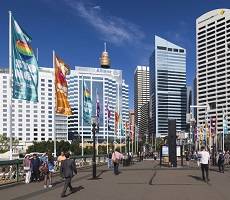October 16, 2015
Sydney leads the way in activity-based working finds global cities report 0
 If employers want to attract the best, they need to create spaces where their staff want to work, because providing an inspiring and enjoyable office is now the most critical, cost-effective way to successfully attract the world’s most talented employees. Knight Frank’s Global Cities: The 2016 Report highlights a shift in thinking by the newest generation of workers who expect the same kind of environment which historically, was the preserve of technology and media firms. This new office combines collaborative spaces with individual work areas, as well as providing amenities that encourage people to think of work as an extension of home. Sydney is leading the way with just under a third (28 percent) of all offices already offering activity-based working (ABW) for employees, where the workspace is specifically designed to suit the whole range of activities which will be accommodated.
If employers want to attract the best, they need to create spaces where their staff want to work, because providing an inspiring and enjoyable office is now the most critical, cost-effective way to successfully attract the world’s most talented employees. Knight Frank’s Global Cities: The 2016 Report highlights a shift in thinking by the newest generation of workers who expect the same kind of environment which historically, was the preserve of technology and media firms. This new office combines collaborative spaces with individual work areas, as well as providing amenities that encourage people to think of work as an extension of home. Sydney is leading the way with just under a third (28 percent) of all offices already offering activity-based working (ABW) for employees, where the workspace is specifically designed to suit the whole range of activities which will be accommodated.













 The commercial property markets in the world’s major cities are evolving against a backdrop of ongoing economic and political uncertainty, according to
The commercial property markets in the world’s major cities are evolving against a backdrop of ongoing economic and political uncertainty, according to 








 The number of firms planning to expand in London is at its highest level (50 percent) since 2012, though retaining employees and improving the capital’s infrastructure remain key concerns. According to the re-launched
The number of firms planning to expand in London is at its highest level (50 percent) since 2012, though retaining employees and improving the capital’s infrastructure remain key concerns. According to the re-launched 
 Newly published research
Newly published research
 A new meta analysis compiled by researchers from Harvard Business School and Stanford University raises questions about the way Government and organisational policies designed to tackle the problems of work related health costs in the United States have largely ignored the health effects of ‘psychosocial workplace stressors’ such as high job demands, economic insecurity, and long work hours. The analysis of 228 existing studies assessed the effects of ten workplace stressors on four specific health outcomes. The researchers claims that job insecurity increases the odds of reporting poor health by about 50 percent, high job demands raise the odds of having a diagnosed illness by 35 percent, and long work hours increase mortality by almost 20 percent. They argue that any policies designed to address these issues should account for the health effects of the workplace environment.
A new meta analysis compiled by researchers from Harvard Business School and Stanford University raises questions about the way Government and organisational policies designed to tackle the problems of work related health costs in the United States have largely ignored the health effects of ‘psychosocial workplace stressors’ such as high job demands, economic insecurity, and long work hours. The analysis of 228 existing studies assessed the effects of ten workplace stressors on four specific health outcomes. The researchers claims that job insecurity increases the odds of reporting poor health by about 50 percent, high job demands raise the odds of having a diagnosed illness by 35 percent, and long work hours increase mortality by almost 20 percent. They argue that any policies designed to address these issues should account for the health effects of the workplace environment.








September 22, 2015
John Fogarty reflects on a career in office furniture spanning five decades 0
by John Fogarty • Comment, Furniture, Workplace design
(more…)